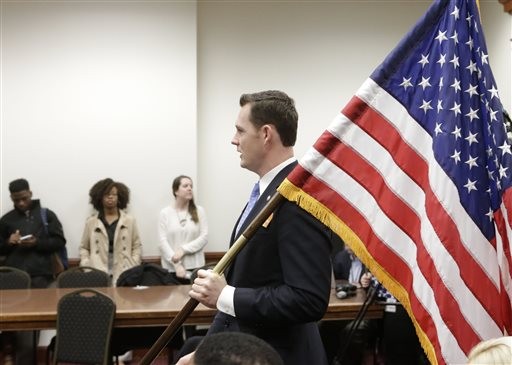ATLANTA (AP) — Towering cranes dot the city's skyline, signaling the rise of a $1.4 billion retractable-roof stadium that is supposed to keep major sporting events streaming to Atlanta.
Those plans may be threatened by a religious exemptions bill that opponents claim would lead to discrimination against gays, lesbians and transgender people.
Already, there are concerns about Atlanta's bid to host the Super Bowl at new Mercedes-Benz Stadium in either 2019 or 2020, prompting Falcons owner Arthur Blank to join a growing list of business leaders fighting the legislation.
The measure could also lead the NCAA to reconsider its decision to award the 2020 Final Four to Atlanta.
"We'll continue to monitor current events, which include issues surrounding diversity, in all cities bidding on NCAA championships and events, as well as cities that have already been named as future host sites," the NCAA said in a statement Monday.
The governing body for college athletics has shown a willingness to get involved in political issues. For instance, none of its championships could be held in South Carolina until the state removed the Confederate battle flag from its capitol grounds. Also, it led the effort to remove "hostile or abusive" nicknames from member schools, which largely centered on Native American mascots and imagery.
"Our commitment to the fair treatment of all individuals, regardless of sexual orientation or gender identity, has not changed and is at the core of our NCAA values," the organization said. "It is our expectation that all people will be welcomed and treated with respect in cities that host our NCAA championships and events."
There are also questions about the College Football Playoff's championship game, set to be held at Mercedes-Benz Stadium in 2018, as well as the Southeastern Conference's lucrative football title game, which begins a 10-season run in the new stadium after it opens next year.
The proposed Georgia law has been approved by both houses of the state Legislature, but still needs the signature of Gov. Nathan Deal. He hasn't indicated what he will do.
Blank is among the most prominent opponents, saying the bill "would have long-lasting negative impact on our state." His Falcons are picking up most of the tab on the new stadium, which will serve as home of both the NFL team and the city's Major League Soccer expansion franchise, Atlanta United.
The new facility will be one of the world's most expensive stadiums and certainly one of the most distinctive, an origami-looking structure with a retractable roof that opens like a pinwheel. It will replace the 24-year-old Georgia Dome, which hosted the Super Bowl in 1994 and 2000 but was rejected in subsequent bids.
The NFL promised to change its stance if the city built a state-of-the-art facility.
Atlanta looked like a shoe-in to host the Super Bowl in 2019 or 2020 based on recent NFL precedent. This past season, the title game was held at the San Francisco 49ers' new stadium, while the 2018 contest has already been awarded to a new stadium under construction for the Minnesota Vikings.
Now, with a vote on the next two available Super Bowls set for May, Atlanta could run into serious opposition if the religious exemptions law is signed by Deal. The other finalists are Miami and New Orleans, which have hosted the game more than any other cities, and four-time site Tampa.
Supporters of the bill say it is needed to protect the rights of those who oppose same-sex marriage on religious grounds, including their refusal to serve or hire someone. Gay-rights advocates say the measure amounts to legalized discrimination, while business groups fear the sort of economic backlash that Indiana faced after passage of a broader law in 2015.
The SEC, which has held its football championship game in Atlanta for the past 22 years, agreed to a decade-long contract to hold the game at Mercedes-Benz Stadium.
Commissioner Greg Sankey said the conference is keeping an eye on the religious exemptions bill.
"We are attentive to this legislative matter as we continue our policy of considering numerous factors in determining sites for our championship events," he said in a statement Monday.
The College Football Playoff, which is not governed by the NCAA, seems more likely to keep its 2018 title game in Atlanta, no matter what the governor decides. The playoff also includes the Peach Bowl, which serves as host of a semifinal game every third season in Atlanta.
Executive director Bill Hancock indicated the CFP's desire to stay out of the debate.
"We will keep an eye on this but our group's focus is on sports," he said in a statement, adding that "public policy matters are better left to the experts and voters to resolve."









